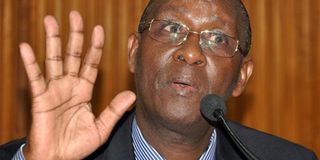Cabinet approves National Youth Policy

The Permanent Secretary Ministry of Gender, Labour and Social Development, Mr Pius Bigirimana, said Cabinet approved NYP on Wednesday and tasked the ministry to lead the new youth agenda focusing on skills development and job creation.
What you need to know:
- The policy includes youth information, community and technology, education, training and capacity building, health, youth involvement, participation and governance, gender, recreation, sports and leisure as well as environmental management.
- The policy urges all the stakeholders to constantly use and refer to this policy document as a source of strength and inspiration for advancing the youth of Uganda in the 21st century.
Kampala. Cabinet has approved the National Youth Policy (NYP) that seeks, among other things, to create an environment that enables young people to reach their potential.
According to the Permanent Secretary Ministry of Gender, Labour and Social Development, Mr Pius Bigirimana, Cabinet approved NYP on Wednesday and tasked the ministry to lead the new youth agenda focusing on skills development and job creation.
The new policy addresses new challenges that youth face, while acknowledging that there is more to be done ahead of the 2020 middle income status deadline.
When contacted yesterday, Mr Bigirimana said the policy intends to identify gaps in youth development, strengthen the existing interventions, introduce new ones and shed those that do not work, adding that it also specifies services rendered, extends coverage and increases impact.
“The new policy is intended to empower communities in diverse areas promote youth skills development and labour productivity while promoting gender equality and transformation of communities,” Mr Bigirimana said.
Under the theme; “Unlocking youth potential for sustainable wealth creation and development”, the policy recognises that the lives of millions of youth are marred by poverty, inadequate education and skills, inadequate work/employment opportunities, exploitation, diseases, civil unrest and gender discrimination.
“And this is what we intend to address in our national youth action plan,” said Mr Bigirimana.
He said it is upon this policy that the National Youth Action Plan builds on to specify priority areas to be undertaken by various stakeholders that include sustainable livelihoods, employment promotion and enterprise development.
The policy includes youth information, community and technology, education, training and capacity building, health, youth involvement, participation and governance, gender, recreation, sports and leisure as well as environmental management.
The National Youth Action plan defines different role players in government, non-governmental organisations and private sectors at national and local levels who would ensure the implementation of the NYP in a cohesive, seamless and integrated manner.
The policy urges all the stakeholders to constantly use and refer to this policy document as a source of strength and inspiration for advancing the youth of Uganda in the 21st century.
It also emphasises investment in youth as not only a social obligation but also a rewarding one in economic sense and describes the youth as the country’s most valuable asset, an integral component of the development process and also provide for and safeguard the future of the nation.




